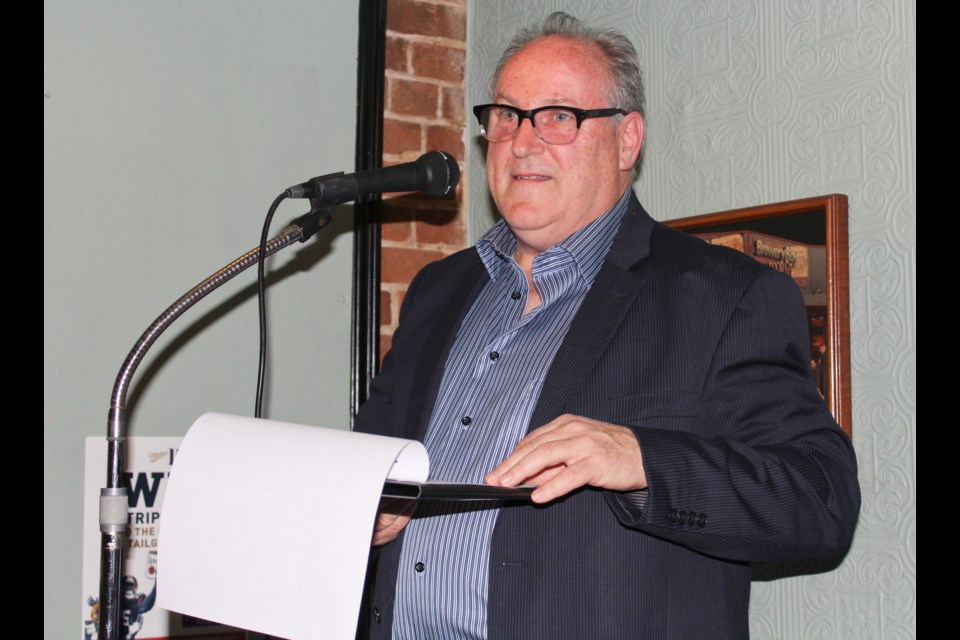Gerry Hawes made two main acknowledgements Monday night after losing the election in Simcoe North: He was disappointed, but not surprised.
The Liberal candidate, who garnered 19,140 votes, placed second to incumbent Bruce Stanton, of the Conservative Party, who won his fifth consecutive term after earning 27,112 votes.
“Not shocked,” Hawes said of his runner-up status, “but I was surprised at the margin … Bruce Stanton had.”
“I didn’t think I was going to win,” he added, but noted he was hoping he would “be able to rally enough of those progressive votes.”
Hawes attributed his realistic outlook to his experience behind the scenes in government. He said he entered the race with a “two-time plan.”
“I saw it as the time to put down the foundation to run again,” he said.
He wouldn’t commit to a second run, but when asked if he was ruling it out, he said, “I think I’m ruling it in.”
“I feel like I was a good candidate, but it just wasn’t in the cards for me this time.”
A minority government is what many predicted, and while Conservative leader Andrew Scheer repeatedly warned of a Liberal-NDP coalition, Hawes doesn’t see that happening.
“I don’t see any reason why there would be a coalition,” he said.
Working together on issues of shared importance is what he expects.
“The NDP and the Bloc (Québécois) are both progressive parties,” Hawes said. “The Liberals are well placed in this minority government.”
Although he wasn’t expecting to become the new MP, there were signs during the campaign that gave him hope. The number of voters identified as Liberal supporters was up over the last election, as was the number of Liberal lawn signs requested.
Then, Hawes learned Liberal leader Justin Trudeau would visit the riding, which he did last week with a stop at Mariposa Market in Orillia. That doesn’t typically happen, Hawes noted, unless the party sees a riding as winnable.
“I guess there were a lot of voters there being polite,” he said.
Candidates who aren’t elected are often asked what went wrong. Hawes isn’t completely sure yet.
“I’m going to have to sit back and think about it,” he said, but added the “significant power of incumbency,” coupled with Stanton being well liked, likely played a part.
It was a tough night for the few dozen supporters who gathered at Brewery Bay Food Company to greet Hawes, though they still gave him a hero’s welcome.
Liz Riley knows the feeling, having placed second to Stanton in the 2015 election. In that election, Trudeau was seeking his first term as prime minister and Riley rode the red wave and earned 39.81 per cent of the vote, while Stanton collected 43.5 per cent.
This time, Hawes had 30.72 per cent, while Stanton’s support barely increased, to 43.52 per cent.
“The difference is that the NDP vote has split the left,” Riley said. “Bruce did not do better.”
She described Hawes’s campaign as “incredibly well run.”
As for the next election, a Liberal win in Simcoe North would “depend on the issues,” she said.
Geoff Booth was also on hand Monday to support Hawes. While he was hoping to see a Liberal win in Simcoe North, he, like Hawes, was realistic. Booth’s job as a college instructor of government and Canadian society gave him a different perspective.
“Normally, incumbents have a relatively easy time reclaiming the throne,” he said. “When Bruce steps down, that’s when you might see a change.”
On the flip side, he said, it’s difficult for an incumbent prime minister to maintain the momentum and support like that enjoyed by Trudeau in 2015.
“For a lot of voters, the bloom’s off the rose, and that’s not unusual for an incumbent party,” he said. “What it looks like we’re going to end up with is a country that is going to continue to be a challenge to govern.”
Booth was “not surprised” Stanton was re-elected, but said the result “gives progressive voters pause to reflect on what would’ve happened if that vote had coalesced.”
Indeed, if the Liberal, NDP and Green vote had combined in Simcoe North in favour of the Liberals, Hawes would have won by more than 6,500 votes.
Booth sees the national result as an opportunity for parties to work together.
“I’m hopeful because the Liberals now need somebody to get something done. It’s a progressive voice. Some of the most progressive legislation that has ever come out came during the (Lester) Pearson years,” he said of Pearson’s time as prime minister in the 1960s.
